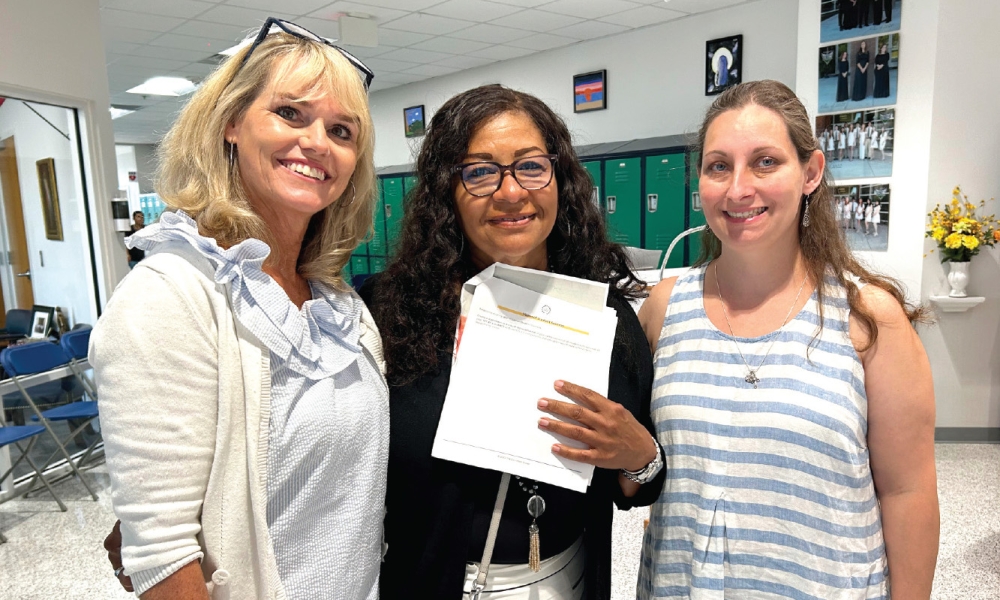
Improving student performance means supporting our teachers first
When our grandparents talk to us about their Catholic education, they bring up stories about the religious sisters who taught them reading, writing and arithmetic. Some of the sisters were strict and others had a more loving approach, but it is safe to say that all served to educate children for this world and the next.
When our grandparents talk to us about their Catholic education, they bring up stories about the religious sisters who taught them reading, writing and arithmetic. Some of the sisters were strict and others had a more loving approach, but it is safe to say that all served to educate children for this world and the next.
Until around the 1950s, religious women were the backbone of Catholic schooling. Most teaching positions are staffed by lay people now, but the foundation laid by religious remains the same.
There have certainly been challenges with funding and enrollment, and Catholic schools have not been immune to the widespread teacher shortage. Despite the challenges, keeping Catholic schools Catholic has become more and more important, and keeping teachers supported and growing professionally is part of that effort.
That’s why Shaileen Riginos, assistant superintendent for the Diocese of Charleston, and her team have spent a significant amount of time over the past year researching ways to make sure the faith is not lost as education progresses.
Research led the team to the Danielson Group, a nonprofit organization that works to strengthen professional practice and promote teaching. Danielson believes that educational policies elevate teacher development and leadership in service of student learning, or “When teachers thrive, students thrive.”
Riginos said the research process began in 2022, and by the end of that year they had identified the Danielson Group as the model that most fits the Catholic Schools Office strategic plan. Training started in early 2023 and by the summer eight schools were identified to work in the pilot program. It concludes in tandem with the 2023-2024 school year.
The purpose is to bring out the best in teachers by creating professional learning programs and policies that provide the right level of support along a teacher’s career path. The Danielson Group developed a framework that outlines teaching practices in four domains. The domains include what happens in the classroom and the demanding practices behind the scenes, such as planning, assessment and professional learning.
Although this method is not specifically Catholic, Riginos said it is flexible so that Catholic values can be woven into every aspect. During this pilot year, the schools require teachers to undergo training, evaluations and performance reviews with the focus remaining on them as professionals. And administrators make supporting teachers the priority.
“It is all about developing more of a common language, focusing on teachers setting goals, improvement and providing a formation process for our Catholic school teachers,” Riginos said. “The beauty of it is that we can infuse our faith into every domain so that our expectations as Catholic school teachers are truly focused on the faith.
“This framework will allow us to define what we expect and our definition of good teaching,” she continued. “We are embracing the opportunity to cross academic excellence with Catholic identity. We will not follow each domain as it is written, but rather add our faith into each and every component. Our goal is to recruit and retain only the very best Catholic school teachers, and a framework such as this is necessary to do that.”
The schools currently piloting the framework are Bishop England High School in Charleston, St. Anthony School in Florence, St. Peter School in Beaufort, John Paull II High School in Ridgeland, and all Catholic schools in the Myrtle Beach area: St. Andrew, St. Michael, Holy Trinity and St. Elizabeth Ann Seton.
Riginos emphasized that this new evaluation process for teachers was more about growth and not about trying to catch mistakes.
“We want to create a culture of sustained professional and spiritual growth through the implementation of a teaching framework that is focused on the formation of the ‘whole teacher’ within the evaluation process,” she explained.
Teachers and administrators learned the Framework for Teaching: a Common Vision for Instructional Excellence during training held in August last year. Participants drew connections between the framework and their own practices. Then they worked to make it the centerpiece of a learning culture and teacher-directed inquiry in the classroom.
New teachers, and those new to diocesan Catholic schools, will participate in a more indepth evaluation, while veteran teachers will move to a tiered cycle. All teachers will create a Professional and Spiritual Growth Plan annually; its formation will be unique and based on the needs of each teacher.
The framework will be implemented into all 31 Catholic schools across the state in 2024.
“Teachers have such a hard job,” Riginos said. “We want them to know that we support them and that we are here for them. This whole framework focuses on the teacher, with the end goal of improving student learning and performance.
“We aren’t just checking boxes,” she added. “The evaluation process is meant for support. It looks at the whole teacher, and it pulls catechesis together with teaching and academics, which in turn equals a stronger Catholic identity.”
Religious women left their mark, and with this framework Catholic school roots will remain strong.
Theresa Stratford is a freelance writer for The Miscellany. She lives in Charleston with her husband and three children and attends the Cathedral of St. John the Baptist. Email her at tmmart89@gmail.com.
